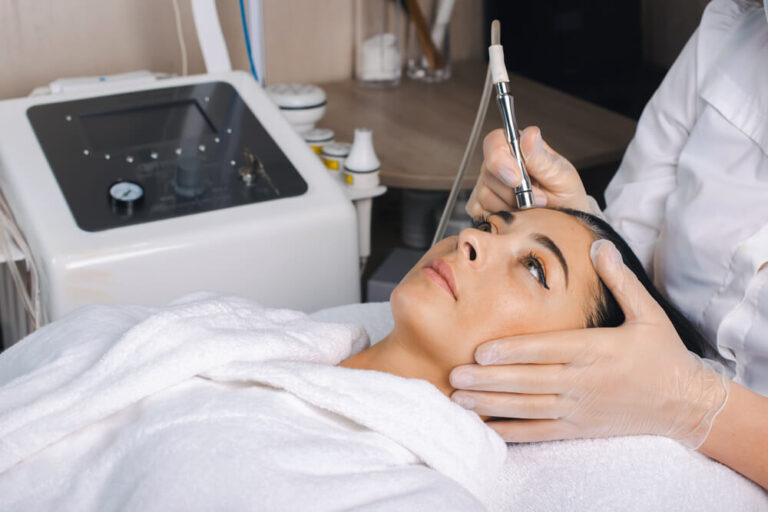Microneedling is a cosmetic procedure that uses small needles to prick the skin. The process is used to encourage the skin to produce more collagen and elastin, which can help to reduce the appearance of fine lines, wrinkles, and scars. While microneedling has been used for a variety of skin concerns, it has recently gained popularity as a treatment for acne.
Acne is a common skin condition that affects millions of people worldwide. While there are many treatments available, including topical creams, oral medications, and laser therapy, microneedling is a non-invasive option that can be effective for some individuals. By creating tiny punctures in the skin, microneedling stimulates the body’s natural healing response, which can help to reduce inflammation and improve the appearance of acne scars.
Benefits of Microneedling for Acne
Microneedling is a minimally invasive cosmetic procedure that has been gaining popularity in recent years for its ability to improve the appearance of acne scars and overall skin texture. Microneedling involves the use of a small device with tiny needles that puncture the skin to create micro-injuries. These injuries stimulate the body’s natural healing process, which results in the production of collagen and elastin, two proteins that are essential for healthy, youthful-looking skin.
Reduction in Acne Scars
One of the most significant benefits of microneedling for acne is its ability to reduce the appearance of acne scars. Acne scars can be challenging to treat, and many traditional treatments, such as chemical peels and laser resurfacing, can be expensive and require significant downtime. Microneedling, on the other hand, is a relatively quick and affordable procedure that can be performed in a dermatologist’s office.
Improved Skin Texture
In addition to reducing the appearance of acne scars, microneedling can also improve overall skin texture. The micro-injuries created during the procedure stimulate the body’s natural healing process, which can result in smoother, more even-looking skin. Microneedling can also help to reduce the appearance of fine lines and wrinkles, making it an excellent option for anyone looking to improve the overall appearance of their skin.
Enhanced Skin Absorption
Another benefit of microneedling for acne is that it can enhance the absorption of skincare products. The micro-injuries created during the procedure create tiny channels in the skin, which can help topical skincare products penetrate deeper into the skin. This enhanced absorption can help to improve the effectiveness of skincare products, making them more effective at treating acne and other skin concerns.
Procedure of Microneedling For Acne
Microneedling is a minimally invasive procedure that is used to treat acne scars. The procedure uses a device that contains tiny needles that puncture the skin to create micro-injuries. These micro-injuries stimulate the body’s natural healing process, which leads to the production of collagen and elastin. The result is smoother, more even skin with fewer acne scars.
Preparation
Before the procedure, the patient’s skin is cleansed and a topical anesthetic is applied to numb the area. The patient’s medical history is also reviewed to ensure that they are a good candidate for the procedure.
Treatment
During the procedure, the microneedling device is passed over the skin, creating tiny punctures. The depth of the punctures is determined by the severity of the acne scars. The procedure typically takes 30 minutes to an hour to complete, depending on the size of the treatment area.
Post-Treatment Care
After the procedure, the patient’s skin will be red and may be slightly swollen. The patient may also experience some mild discomfort, which can be managed with over-the-counter pain relievers. The patient should avoid sun exposure and use a broad-spectrum sunscreen with an SPF of 30 or higher. The patient should also avoid using any harsh skincare products for at least 24 hours after the procedure.
Overall, microneedling is a safe and effective treatment for acne scars. Patients should consult with a qualified healthcare professional to determine if they are a good candidate for the procedure.
Do Microneedle Acne Patches Work?
Microneedling is a popular cosmetic procedure that involves pricking the skin with tiny needles to stimulate collagen production and improve skin texture. Recently, microneedle acne patches have gained popularity as a new way to treat acne.
Microneedle acne patches work by using tiny needles to penetrate the skin and deliver active ingredients directly into the pores. The patches are typically made of hydrocolloid material, which helps to absorb excess oil and pus from the pimple.
Studies have shown that microneedle acne patches can be effective in reducing the size and redness of pimples. In one study, participants who used microneedle patches for three days saw a significant reduction in the size and redness of their pimples compared to those who did not use the patches.
However, it is important to note that microneedle acne patches are not a cure for acne. They can help to reduce the appearance of individual pimples, but they do not address the underlying causes of acne such as hormonal imbalances or poor skincare habits.
Conclusion
Microneedling is a promising treatment option for individuals suffering from acne. The procedure involves using a device with tiny needles to create micro-injuries in the skin, which triggers the body’s natural healing process and stimulates collagen production.
Studies have shown that microneedling can improve the appearance of acne scars, reduce the frequency of acne breakouts, and enhance the overall texture and tone of the skin. However, it is important to note that the procedure is not a cure for acne and may require multiple sessions to achieve optimal results.
Overall, microneedling is a promising treatment option for individuals struggling with acne. While further research is needed to fully understand its long-term effects, current evidence suggests that it can be an effective and safe option for improving the appearance and health of the skin.



